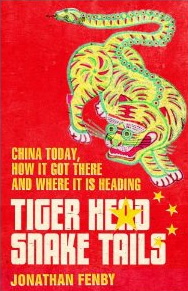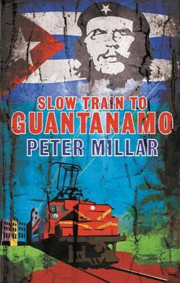People
Ex-Reuters writers pack them in at book festival
Thursday 13 September 2012
 Two former Reuters journalists attracted full houses to talks about their new books at this year’s Edinburgh International Book Festival. For both Jonathan Fenby and Peter Millar it was a repeat performance as both had appeared in previous festivals.
Two former Reuters journalists attracted full houses to talks about their new books at this year’s Edinburgh International Book Festival. For both Jonathan Fenby and Peter Millar it was a repeat performance as both had appeared in previous festivals.
Former Reuters editor Fenby - with historian Dilip Hiro - in answer to “What future for China and Central Asia?” coupled a succinct survey of historical background with realistic analysis of the present situation and possible developments in China and the buffer republics between China and Russia.
A week earlier Millar entertained and informed listeners with a lucid account of how he tried to avoid the usual tourist traps and see the realities of Cuban life.
Outlining the complex nature of China, Fenby said it would brook no interference in its society but did not aim to export its communism or pose a military threat to the West.
He said his latest book - Tiger Head, Snake Tails: China Today, How It Got There and Where It Is Heading - tried to explain that China has its own rules and operates on its own. “It doesn’t set a model for the rest of the world. It doesn’t want to rule the world. It’s not going to collapse.”
Referring to Mao Tse Tung’s Great Leap Forward, he said Mao’s successor, inheriting a country and party brought to its knees by the Cultural Revolution, decided that economic growth would restore China a great power and maintain the Communist Party’s position.
The Chinese Communist Party is the world’s largest political body. With 80 million members and a 70 million strong youth wing, a nine-member central committee rules a Leninist state through an appointed government.
A new committee to be named at a congress later this year will face many difficulties - a widening wealth gap, huge environmental problems, and corruption - and the question is whether it will upset a system that has worked well so far by doing something about them.
 Veteran foreign correspondent Peter Millar told a capacity audience that Cuba was the only communist country where he did not feel under constant watch by secret police or informers.
Veteran foreign correspondent Peter Millar told a capacity audience that Cuba was the only communist country where he did not feel under constant watch by secret police or informers.
It was noticeable, Millar said, that people would openly criticise the regime in public without any sign that they feared the consequences. His latest book - Slow Train to Guantanamo - is based on a recent visit in which he stayed in B&B houses rather than hotels and drank where locals drank, not tourist haunts.
A graphic account of the difficulties in buying a rail ticket informed and amused the audience, more than half of whom had been, or planned to go, to Cuba on holiday.
Summing up life in one of the world’s three remaining Communist countries, Millar said there was good education and health service but also extreme poverty and a low standard of living for anyone without access to hard currency. There were six classes, with party functionaries at the top, lower echelons ranked largely by their access to hard currency and those with only meagre peso earnings at the bottom. Cuba has two currencies, pesos and convertible pesos, he said. Visitors must change foreign currency into convertible pesos for accommodation, souvenirs, luxury goods and even a special beer. Beers available for ordinary pesos were better and much cheaper, he said.
A lively question session covered the safety of private accommodation, bus, rail and taxi travel, the sex trade and some sound advice. “Don’t be lured by the offer of lobsters,” he said. “Cubans boil a lobster for hours and it’s inedible.”
Millar said some of his books would be available at a signing session but the new one wasn’t as the publisher could not pay the printer. “Download it on Kindle. It’s only £2.99 and I get more from that than I do from the printed version,” he told the audience. ■
- « Previous
- Next »
- 457 of 575